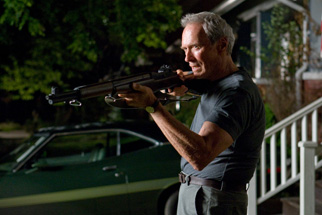Movie Review: Gran Torino
By Matthew Huntley
December 29, 2008
BoxOfficeProphets.com

In most cases, it's the underlining story and performances that govern if Eastwood's style works. Gran Torino contains a decent story, but the supporting performances sometimes cause it to fall flat. Eastwood, in one of his better acting roles, plays an angry and testy widower named Walt Kowalski. Stubborn and set in his own ways, Walt, or "Mr. Kowalski" as he likes to be called, hardly knows his two sons (Brian Haley and Brian Howe) and he gives his grandchildren cold and grim looks at his wife's funeral.
Walt doesn't much care for his new Asian neighbors, either, a Hmong family who recently moved in next door. He looks upon them with disdain and makes racial slurs, but their feisty grandmother sends them right back and mumbles in her native tongue why the grumpy old white man won't just pack up and move away. After all, most of neighborhood has turned Asian anyway. But it's obvious Walt hasn't caught up with the times - he still cuts grass with a push lawn mower, he doesn't accept people of other races, and he refuses to acknowledge foreign cars. He is not unlike a typical American grandfather - a Korean War veteran with traditional, non-bending values from a different era.
Since his wife's death, Walt's greatest love has become his 1972 Gran Torino, which he keeps hidden in his garage. The car reminds him of his glory days as a Ford factory worker. Like he says of many things in his house, "They just don't make them like this anymore."
When an Asian gang spots the Gran Torino in his garage, they coerce Thao (Bee Vang), Walt's 15-year-old neighbor, to steal it as part of his initiation. Walt catches him in the act and might have killed him had he not tripped over a tool box. Thao's sister, Su (Ahney Her), orders her brother to work off his family's dishonor by doing chores for Walt.
This isn't the first time Walt has confronted Thao, Su or the Asian punks. The leader of the gang is actually Thao's cousin and when they start beating up on him and his family in the front lawn, Walt threatens them with a gun, grinding his teeth and ordering them, "Get off my lawn." Even if Walt was only looking out himself, the rest of the neighborhood considers him a hero and they show their respects by placing an inordinate amount of food on his porch.
After Thao starts his penance, he and Walt form an unlikely friendship. The old man takes the boy under his wing and sort of becomes a surrogate father figure. He helps Thao find a construction job; he teaches him about tools, hardware and dating; and he gives him a lesson on how real men talk to each other. There's an amusing scene when Walt takes Thao to the local barber shop, and Walt and the barber (John Carroll Lynch) exchange harmless racial insults. "You see, that's how real men talk."
Always lingering is the threat of the local gang, who want revenge against Thao and the old man. When something tragic happens, Walt becomes his new neighbors' unofficial protectors. Father Janovich (Christopher Carley), a young priest who promised Walt's wife he'd get him to come to confession, tries to guide him away from potential acts of violence.
Gran Torino is about many things. It's about learning to love and accept people who are different; it's about reconciliation; it's about forgiveness; it's about faith; it's about family; it's about friendship; it's about revenge; it's about sacrifice. All of these subjects are obvious to us when we're watching the film, and Eastwood doesn't try to be subtle. The scenes involving the gangs are the most powerful and it was entertaining to see an old man like Eastwood kick some butt, even if it wasn't exactly surprising given his reputation in westerns and the Dirty Harry franchise.
But even with its heavy themes, Gran Torino lacks a certain complexity and energy. Eastwood keeps it all too straightforward and every character is rigidly defined. Everything in the movie is what it is and that's that. There's no sense of adventure or ambiguity in regards to the characters or storytelling, so it's not as "fun" to watch as other serious dramas, if you know what I mean. Even the cinematography is mostly comprised of still shots and the dialogue often sounds like rambling.
I think Eastwood wants us to take everything at face value. We always know what the characters are thinking and we aren't really challenged to interpret their personalities or motivations otherwise. This method didn't work for me. I'm aware that life isn't always complicated and can sometimes be straightforward, but that doesn't necessarily make for compelling drama, at least not in this case.
Another problem is the acting, which isn't up to the standards of Eastwood's previous efforts. I'm referring mostly to the young Vang and Her as the two Hmong teenagers. They're clearly not experienced actors and they unfortunately make it easy for us to tell. Their delivery sounds artificial and they lack conviction. I'm not trying to be mean, but because we know Eastwood has garnered such great performances from other actors in years past, seeing these two perform was troubling.
Perhaps my standards are too high, but when I go to a Clint Eastwood film, I expect something more daring and emotional than Gran Torino. Eastwood has a good story on his hands, but the manner in which he handles it is too direct and bland. Yes, there are some profound themes here, but they're not explored beyond the obvious. Everything is, simply, what it is, and although the film does have some meaning and truth behind it, there's not enough narrative vigor for it to be considered essential viewing.